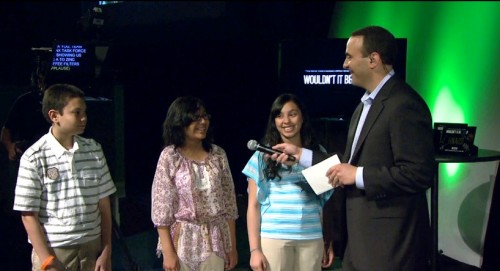Is science the next hot thing?
in magazine reports (and maybe also in blogs about science), it is common to say that three events are enough to mark a trend. Well, let me announce a new trend: America's entertainment industry stars are coming to the aid of science. Here are three leading entertainers who joined the task.

In an editorial published in the March 2012 issue of the journal Science, actor, director, and screenwriter Alan Alda announced a science communication contest in which 11-year-old children would be the judges. It's fun to read." Among his other occupations, Alda is a founding board member of the Center for Science Communication at Stony Brook University, which hosts the competition.
The Icelandic pop star Björk appeared in February 2012 in a series of concerts at the "Hall of Science of New York" to promote her new album "Biophilia" (Biophilia). She also helped develop a series of lessons for middle school students dealing with the scientific concepts mentioned in the album, such as crystalline structures, moon shows and viruses.

At the beginning of 2012, the American rapper will.i.am teamed up with the media giant Time Warner to launch a competition called "Wouldn't it be cool if..." (www.wouldntitbecoolif.com), which aims to encourage children aged 10 to 15 to propose ideas for inventions based on mathematics or science that will make the world "an even more wonderful place." In the summer of 2011, will.i.am participated in the production of a special TV program for the return to school called "i.am FIRST)) - science is rock'n'roll" which aims to encourage studies, science and technology. During the preparation of the program, he managed to convince the singer Rihanna to send her millions of fans a message on Twitter: "Science is dope."
Admittedly, there is still a long way to restore science to its rightful place in American society [and society in general]. And yet, I wonder with the good work these stars are doing heralds the beginning of a profound change in our culture. Is science really cool again?
Not sure. The future of science looks rather bleak. At the annual conference of the American Association for the Advancement of Science (AAAS), held in February 2012 in Vancouver, Canada, the chairman of the association, Nina Fedoroff, said that she was "scared to death" in view of the rise in power of the anti-science movement. "We're sliding down the slope back to a dark time," Fedoroff said, "and it seems we can't do much about it." I am depressed to the core."
So it occurred to me that we, the scientists, contribute to popular interest in science. Perhaps they simply tend to show sympathy for helpless groups fighting for their existence, such as endangered animals or abandoned children, and it is the scientists who, knowingly or unknowingly, invite that kind of sympathy.
Fedoroff joins the chorus of scientists pleading for help. In February 2012, for example, the "Organization of Concerned Scientists" published a report titled "Wood or Pelly - Either They Win or We Lose: How Commercial Corporations Harm Science at the Public's Expense." And in 2010, an update to the 2005 report was published by the American National Academies under the title: "Flying Above the Storm's Edge, Part II: A Category 5 Hurricane is Quickly Approaching" which predicts bleakness for the scientific and technological future of the USA.
Branding scientists as a rare and endangered species is a questionable marketing strategy that I would not recommend for use under normal conditions. But in the current state of affairs, it seems that in Hollywood, at least, the method works.
Mark Koechner according to Scientific American's guest blog:

One response
I think that science is seen by these artists as a representative of humanism and enlightenment - that is, a line of thought that God loved on rationalism on the one hand, and belief in man's power to influence his destiny on the other hand.
It is not difficult to see how this way of thinking is connected to tolerance of ideas, to aversion to religious orders, to sympathy for universalism.
All of these stand in contrast to conservative forces that oppose progress, that derive moral justifications from various scriptures, that attempt to control their believers and their lifestyles.
To me the division is clear - so this phenomenon is not surprising at all.